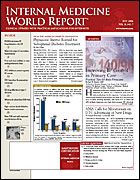Publication
Article
A Short Walk in the sun to Prevent Cancer?
Author(s):
From The American Urological Association
Low Vitamin D Levels Linked to Increased Risk in Men
Journal of the National Cancer Institute
Tell your male patients it is time to get some sunshine. If they don’t, they may not be getting enough vitamin D and could be at increased risk of cancer, according to a study published in the (2006;98:451-459).
IMWR
“These findings add further evidence that a poor vitamin D status may increase the incidence and mortality from cancer, especially for cancers of the digestive system,” Edward Giovannucci, MD, ScD, of Harvard University School of Public Health, Boston, told . “These include the oral cavity, esophagus, stomach, pancreas, and colon and rectum.”
Most vitamin D is absorbed from sunshine, said Dr Giovannucci. “Recommendations for sun avoidance to prevent skin cancer are warranted, especially for light-skinned individuals. But consideration of moderating such messages should be given. Vitamin D intakes up to 2000 IU/day are considered safe, though more and more evidence suggests that this level is very conservative.”
Dr Giovannucci and colleagues examined data from 47,800 men enrolled in the Health Professionals Follow-Up Study to determine if vitamin D intake played a role in cancer incidence and mortality. Between 1986 and 2000, 4286 cancer cases and 2025 cancer deaths were reported. Vitamin D status calculations showed that an increase in vitamin D levels by about 1500 IU/day correlated with a 17% reduction in total cancer incidence, a 29% reduction in total cancer mortality, and 43% and 45% reductions in incidence and mortality, respectively, from digestive system cancers.
Among those with the lowest vitamin D exposure, 758 cancers and 326 cancer deaths occurred annually per 100,000 men. Among those with the highest vitamin D exposure, the respective numbers were 674 cancers and 272 cancer deaths.
In addition to established reasons (eg, bone and musculoskeletal health, immunity) for obtaining adequate vitamin D, Dr Giovannucci said, “Although not definitively proven, cancer prevention may be an additional benefit of improving vitamin D status. Physicians should consider testing for vitamin D deficiency, especially for high-risk individuals. It may turn out that even higher levels...may be optimal, but certainly treating deficient levels should be a priority.”
The investigators emphasize the need for ongoing clinical study. “Confirming that vitamin D levels indeed account for the associations we observed is critical, because current health recommendations typically discourage high intake of vitamin D and high levels of sun exposure, at least without use of sunscreen, which effectively blocks vitamin D production,” they write.
In an accompanying editorial (pages 428-430), Gary Schwartz, PhD, MPH, and William Blot, PhD, write, “The promising results from both observational and laboratory studies should usher in a new era of intervention studies of vitamin D and cancer risk....If the promise of vitamin D holds, a brief walk in the sun may turn out to be a step toward cancer prevention.”






